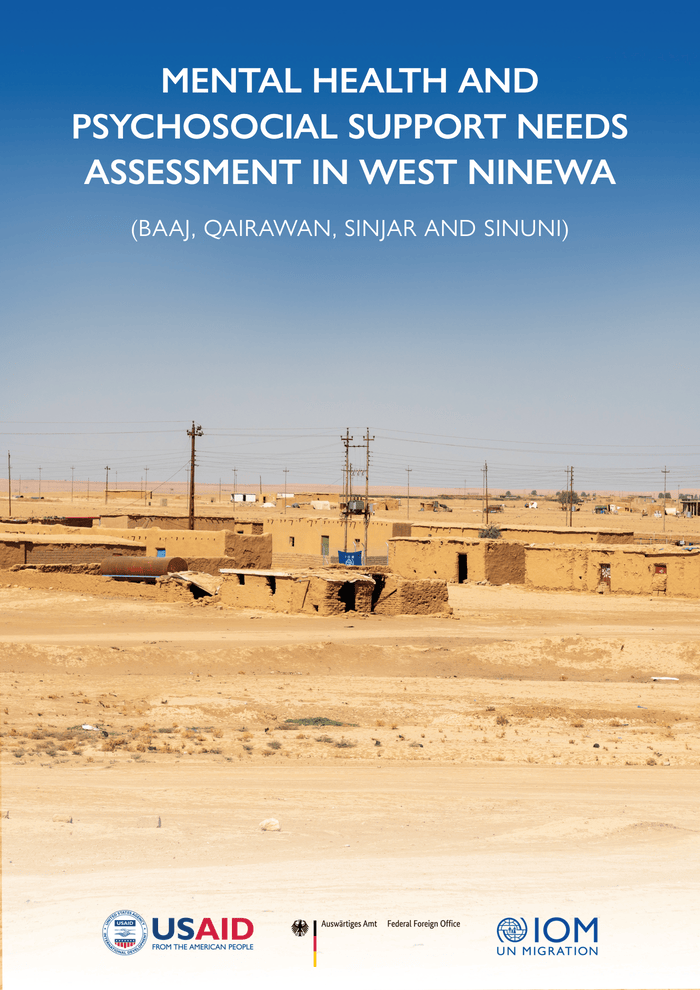
1.1. BACKGROUND
The MHPSS needs assessment conducted in the West Ninewa region of Iraq, covering the districts of Baaj, Sinjar and subdistricts of Qairawan and Sinuni, serves as a critical exploration into the challenges and requirements of IDPs and returnees within this dynamic and complex geographical context. The region, marked by a history of displacement and conflict, has witnessed the profound impact of geopolitical forces and internal conflicts, resulting in the displacement of communities in various provinces.
In addition to displacement and the Islamic State of Iraq and the Levant’s (ISIL) suppression and atrocities towards the Muslim Arab population in Baaj and Qairawan, one of the most devastating episodes in this history of displacement unfolded in Sinjar and some parts of West Ninewa, including Sinuni, where the Yazidi community faced unprecedented persecution and displacement following the brutal ISIL attacks in 2014 (Cetorelli et al., 2017). The ISIL onslaught targeted Yazidis specifically, resulting in mass killings, abductions and forced conversions. Thousands of Yazidi families fled Sinjar and its subdistricts and villages to escape the atrocities, seeking refuge in neighbouring areas and temporary camps.
IOM’s Data Tracking Matrix (DTM) indicates that between 2014 and 2023, there were over 1 million IDPs in Dohuk, with most being from West Ninewa. DTM data also show that a smaller number of them reached Erbil and Sulaymaniyah governorates. Most displaced Yazidis from this region escaped to Sinjar Mountain first and then sought shelter in these governorates. The displacement of the Yazidi community in Sinjar and its subdistricts adds another layer to the overall narrative of internal displacement in the West Ninewa region, evidencing the urgent need for tailored interventions that address the unique challenges faced by different communities affected by ISIL’s atrocities. Understanding the specific experiences of Yazidi displaced populations in Sinjar and Sinuni is integral to creating effective strategies for their reintegration into a post-conflict society.
Conducting a MHPSS needs assessment is imperative in the context of the West Ninewa region due to impacts of displacement and conflict on the well-being of its residents. Previous research found that the complex experiences of internal displacement, particularly in the aftermath of targeted attacks result in severe psychological distress and trauma (Rasheed et al., 2022; Rofo et al., 2023).
Understanding the mental health and psychosocial needs of displaced and returnee populations is essential for tailoring interventions that address the visible and invisible damages left by conflict. This assessment aims to uncover the challenges faced by individuals and communities, recognizing the intersectionality of factors such as gender and disability.
By delving into the psychosocial landscape, the assessment seeks to identify not only the immediate mental health and psychosocial needs but also the underlying social and cultural dynamics that influence well-being. This understanding will inform the development of targeted and culturally sensitive MHPSS programmes, fostering resilience and aiding in the long-term recovery of the diverse communities in the West Ninewa region.
1.2. OBJECTIVES OF THE NEEDS ASSESSMENT
This assessment seeks to comprehensively understand the current conditions faced by the displaced and returnee populations in West Ninewa in terms of mental health and psychosocial well-being and other essential aspects including education, employment, livelihoods, health care and safety.
By focusing on these specific districts, we aim to capture the unique experiences and needs of the diverse communities residing in the region, providing a nuanced foundation for informed and targeted interventions to address their immediate and long-term requirements.
1.3. SCOPE AND METHODOLOGY
This needs assessment was designed to comprehensively evaluate the needs and challenges faced by IDPs, returnees and host communities in the West Ninewa region of Iraq, specifically focusing on Baaj, Qairawan, Sinjar and Sinuni. The geographical scope was chosen to capture the distinctive experiences of diverse communities affected by internal displacement and phases of return within this region. The assessment aimed to provide a nuanced understanding of the complex interplay of factors influencing the mental health and psychosocial wellbeing of the vulnerable populations in the region, taking into consideration the unique sociocultural, ethnic and religious identities that contribute to the region’s rich diversity.
To ensure a comprehensive and multifaceted analysis, a mixed-method approach was adopted, combining quantitative and qualitative data collection methods. The convenient sampling method was employed to reach a broad cross-section of affected populations including IDPs, returnees and host community members. Efforts were made to include diverse groups, representing various ethnicities, religious identities, genders, levels of education and individuals with disabilities.
A structured survey was developed, incorporating closed-ended questions to gather quantitative data on key indicators such as demographics, psychosocial well-being, livelihoods, health, education and shelter conditions. The survey was administered to a representative sample of households across the targeted districts, with an emphasis on obtaining a balanced representation of different demographic groups.
In-depth interviews, FGDs and key informant interviews were conducted to capture the lived experiences and perspectives of the displaced populations. This qualitative phase allowed for a deeper exploration of individual stories, community dynamics and specific challenges faced by various groups. Subsequent analysis focused on understanding the intersectionality of unique challenges faced by different gender groups, individuals with disabilities, varying educational backgrounds and diverse ethnic and religious communities.
